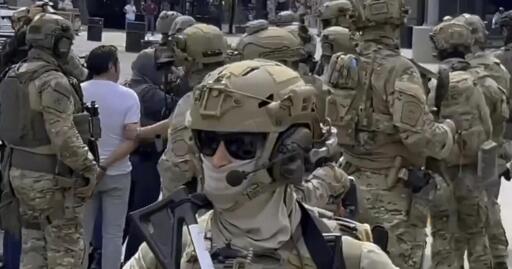The alleged officers detaining hundreds if not thousands of people each day in California and across the country are often masked. They sometimes refuse to answer questions, including which agency they represent. They threaten force — and even use it to make arrests of bystanders — when they are challenged.
In the first video I watched, a man in an unmarked car detains another man sitting on a bus bench in Pasadena. The man presumed to be a federal agent has on a vest that simply says “Police” and a cheap black ski mask that covers every bit of his face — the kind that looks like it was purchased on Amazon and that we have previously most associated with criminals such as robbers and rapists. A few of his colleagues are in the background, some also seemingly masked.
If these men approached me or one of my kids dressed like that, I would run. I would fight. I would certainly not take his word that he was “police” and had the right to force me into his car.
In the second video, another presumed federal agent jumps out of his unmarked vehicle and draws his weapon on a civilian attempting to take a photo of the license plate.
Yes — he points his gun at a civilian who is not threatening him or committing a crime. Folks, maybe you consider it a bad idea to try to photograph what may or may not be a legitimate police operation, but it is not illegal. This alleged officer appears to have simply not liked what was happening, and threatened to shoot the person upsetting him. The man taking the photo ran away, but what would have happened had he not?
These actions by alleged authorities are examples of impunity, and it is what happens when accountability is lost.



Impersonating police or military is usually a very high risk thing to be doing.
Failure to act, not doing things while you still have time, also has a very high risk.
Its a very, very common mental miscalculation to only look at the risk on one side of the balance sheet.
When it becomes high risk to simply exist, that might finally be the tipping point.
Historical anecdote: Germany never had a tipping point. The people effectively folded.
https://en.m.wikipedia.org/wiki/They_Thought_They_Were_Free
Your point?
The political climate in America is deeply imbalanced. Right-wing violence is so common because it is tacitly or openly sanctioned by the state—it aligns with existing power structures. This is why, historically, regular Germans didn’t rise up against the early Nazi movement: the violence was coming from those the state favored. When left-wing groups try to mimic these tactics—like impersonating secret police or kidnapping elites—they invite swift and deadly repression. The government does not treat both sides equally. One is shielded; the other is crushed.
A bunch of ICE are neither, they are just bounty hunters
Honest question, what’s a solution that doesn’t carry risk?
Internet comments. Albeit it’s no risk no reward.
Also to do basically every single thing ICE is doing that your pizza delivery guy isn’t.
And if you have a really good pizza delivery guy, some of the stuff they both do.
What’s the difference though?
Is there some essential “policeness” that “real” police have?
Are they announced with oils? Blessed by the divine?
They’re not enforcing laws, they’re not working for a collective good, they’re not maintaining ‘order’, so genuinely what would the difference be?
I’m not necessarily endorsing. I think this goes some ugly places, but it’s illegal when they do it too.